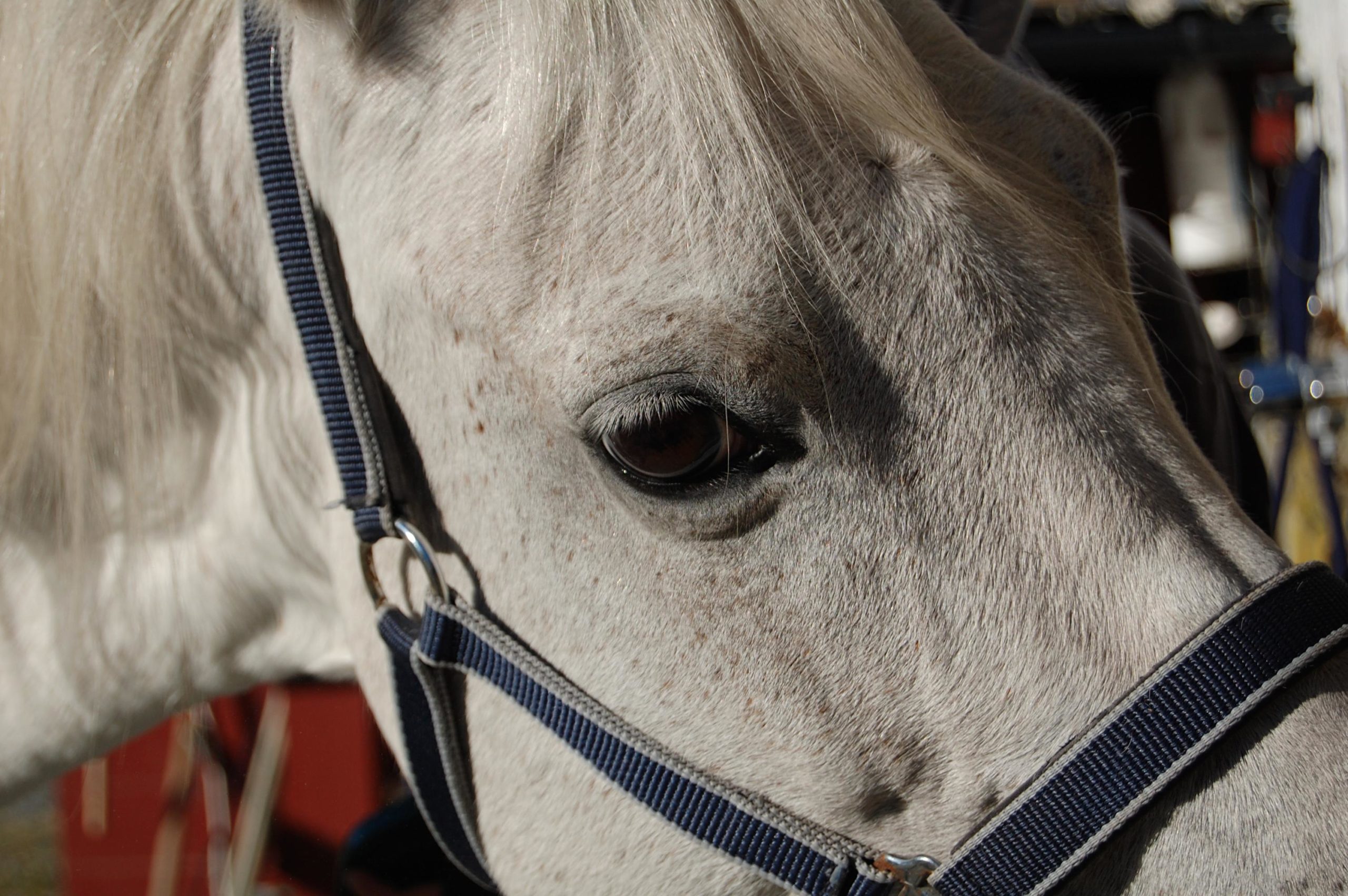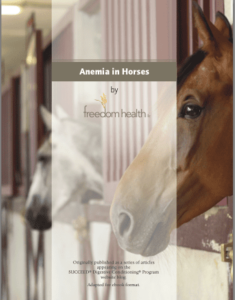 This is Pt. 3 of Parasites and the Equine Gut, a new series investigating the connection between parasite control and your horse’s digestive health — and what we can do to help.
This is Pt. 3 of Parasites and the Equine Gut, a new series investigating the connection between parasite control and your horse’s digestive health — and what we can do to help.
In the first two posts of this series, we discussed why worms are still so common in horses, and how an infection can affect your horse’s nutrition. In Pt. 3,
Parasites and Anemia in Horses, we address a little-discussed problem in the horse world —
anemia, a condition where horses have reduced red blood cell mass, which impacts their ability to carry adequate oxygen to tissue and muscles. This often results in lethargy, poor performance and poor recovery after exercise.
Those who participate in disciplines requiring extreme speed and fast recovery, such as racing or polo, frequently keep closer tabs on red blood cell counts. However, a healthy red blood cell count is important for all disciplines, as
anemia is symptomatic of larger, more serious problems, including a parasitic infection.
Defining Anemia in Horses
A simple blood test conducted by your vet is sufficient to
diagnose anemia. The test measures the horse’s packed cell volume (PCV). In horses, a normal PCV ranges from 32%-48%. When a horse’s PCV levels fall below 30, the horse is considered anemic. A diagnosis of anemia may be a relief for horse owners concerned about a horse’s otherwise unexplained lethargy, poor coat condition or lack of appetite.
There is good news. In most cases,
treating the underlying cause of anemia will usually allow your horse to regain the red blood cell levels he needs in a matter of weeks.
The Relationship Between Parasites and Anemia
While it’s easy to see that a low red blood cell count is detrimental to your horse’s health and well-being, it’s crucial to understand that anemia is always a symptom of a larger health issue that needs to be identified and resolved. There are
three major causes of anemia in horses —
- blood loss due to internal or external bleeding
- destruction of blood, caused by disease, infection, toxins, or parasites
- reduced red blood cell production, due to disease or nutritional deficiencies.
The first two types of anemia can both be related to parasitic infection. In particular,
chronic anemia from blood loss is a common side effect of parasites affecting the gastrointestinal tract of the horse.
Large strongyles — aptly known as blood worms or red worms — are the parasites most closely associated with anemia. Both the larvae and the worms cause damage that leads to blood loss, and consequentially, anemia. As larvae, large strongyles migrate throughout the organs via the blood vessels, causing damage and leaving behind ulcerated nodules. As mature adults, strongyles attach to the large intestine and feed on a specific spot before moving on to another spot. When they evacuate, they leave behind an exposed “pit” in the mucosal lining, which can become infected and/or ulcerated and may bleed.
Ulceration with potential blood loss is also associated with tapeworms and bots when they attach to the mucosal lining in the GI tract.
While not directly associated with the digestive tract, a type of protozoan parasite transmitted by ticks infects horses’ red blood cells. These parasites destroy red blood cells, a disease known as babesiosis.
Treat Parasites to Resolve Anemia in Horses
Treating anemia — regardless of its cause — is only done effectively by resolving the health issue that is causing the anemia. Trying to use iron and vitamin B12 supplements to treat anemia is simply putting a band-aid on the problem.
If the underlying problem is parasites, treating and controlling the parasites effectively will let the horse’s red blood cell counts return to normal levels without further intervention.
Up Next: Parasites and Ulcers
Like anemia, which can be caused by the damage created by parasites, ulcers can also be a result of a parasite infection. An equine ulcer is simply a lesion on the lining of a horse’s stomach. Gastric ulcers are believed to be caused by acid, stress and possibly bacteria — but these lesions can also be caused by parasites.
Subscribe to the SUCCEED blog as we talk more about the relationship between worms and ulcers in Part 4: Parasites and Ulcers.
 Get Your Free Anemia in Horses E-Book
Get Your Free Anemia in Horses E-Book
Did you find this article helpful? Download your free copy of the Anemia in Horses e-book and take the whole series home with you as a printable PDF to read and share at your leisure.
Register Now to Access Your Free Download:
Already a member?
Login in here to access our E-Book Library.
 This is Pt. 3 of Parasites and the Equine Gut, a new series investigating the connection between parasite control and your horse’s digestive health — and what we can do to help.
In the first two posts of this series, we discussed why worms are still so common in horses, and how an infection can affect your horse’s nutrition. In Pt. 3, Parasites and Anemia in Horses, we address a little-discussed problem in the horse world — anemia, a condition where horses have reduced red blood cell mass, which impacts their ability to carry adequate oxygen to tissue and muscles. This often results in lethargy, poor performance and poor recovery after exercise.
Those who participate in disciplines requiring extreme speed and fast recovery, such as racing or polo, frequently keep closer tabs on red blood cell counts. However, a healthy red blood cell count is important for all disciplines, as anemia is symptomatic of larger, more serious problems, including a parasitic infection.
This is Pt. 3 of Parasites and the Equine Gut, a new series investigating the connection between parasite control and your horse’s digestive health — and what we can do to help.
In the first two posts of this series, we discussed why worms are still so common in horses, and how an infection can affect your horse’s nutrition. In Pt. 3, Parasites and Anemia in Horses, we address a little-discussed problem in the horse world — anemia, a condition where horses have reduced red blood cell mass, which impacts their ability to carry adequate oxygen to tissue and muscles. This often results in lethargy, poor performance and poor recovery after exercise.
Those who participate in disciplines requiring extreme speed and fast recovery, such as racing or polo, frequently keep closer tabs on red blood cell counts. However, a healthy red blood cell count is important for all disciplines, as anemia is symptomatic of larger, more serious problems, including a parasitic infection.

 Get Your Free Anemia in Horses E-Book
Get Your Free Anemia in Horses E-Book

